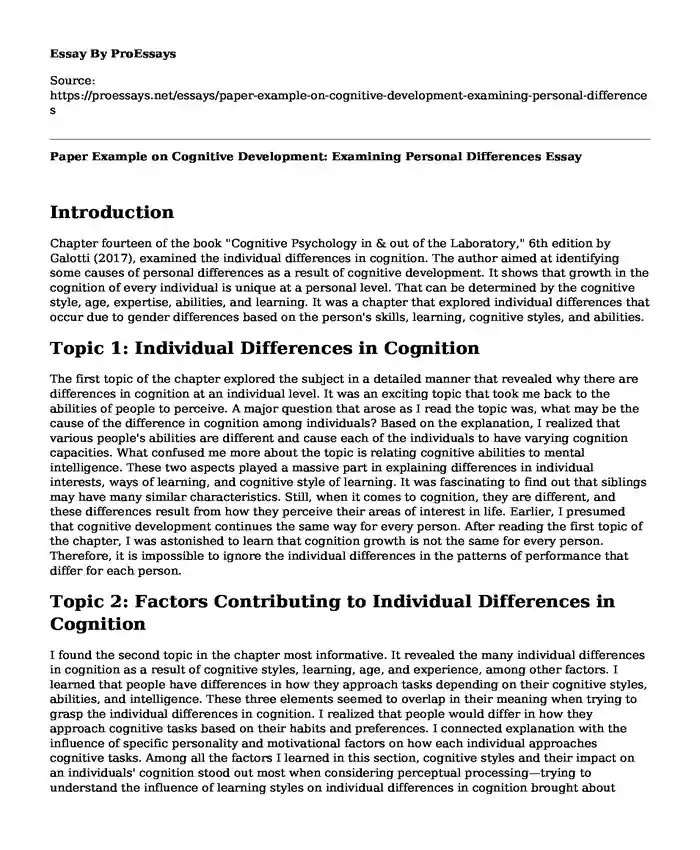Introduction
Chapter fourteen of the book "Cognitive Psychology in & out of the Laboratory," 6th edition by Galotti (2017), examined the individual differences in cognition. The author aimed at identifying some causes of personal differences as a result of cognitive development. It shows that growth in the cognition of every individual is unique at a personal level. That can be determined by the cognitive style, age, expertise, abilities, and learning. It was a chapter that explored individual differences that occur due to gender differences based on the person's skills, learning, cognitive styles, and abilities.
Topic 1: Individual Differences in Cognition
The first topic of the chapter explored the subject in a detailed manner that revealed why there are differences in cognition at an individual level. It was an exciting topic that took me back to the abilities of people to perceive. A major question that arose as I read the topic was, what may be the cause of the difference in cognition among individuals? Based on the explanation, I realized that various people's abilities are different and cause each of the individuals to have varying cognition capacities. What confused me more about the topic is relating cognitive abilities to mental intelligence. These two aspects played a massive part in explaining differences in individual interests, ways of learning, and cognitive style of learning. It was fascinating to find out that siblings may have many similar characteristics. Still, when it comes to cognition, they are different, and these differences result from how they perceive their areas of interest in life. Earlier, I presumed that cognitive development continues the same way for every person. After reading the first topic of the chapter, I was astonished to learn that cognition growth is not the same for every person. Therefore, it is impossible to ignore the individual differences in the patterns of performance that differ for each person.
Topic 2: Factors Contributing to Individual Differences in Cognition
I found the second topic in the chapter most informative. It revealed the many individual differences in cognition as a result of cognitive styles, learning, age, and experience, among other factors. I learned that people have differences in how they approach tasks depending on their cognitive styles, abilities, and intelligence. These three elements seemed to overlap in their meaning when trying to grasp the individual differences in cognition. I realized that people would differ in how they approach cognitive tasks based on their habits and preferences. I connected explanation with the influence of specific personality and motivational factors on how each individual approaches cognitive tasks. Among all the factors I learned in this section, cognitive styles and their impact on an individuals' cognition stood out most when considering perceptual processing—trying to understand the influence of learning styles on individual differences in cognition brought about mixed meaning on the idea of specific styles. I think psychologists can benefit greatly by reading this topic to gain knowledge of individual differences in cognition. Such information is useful in differentiating the cognitive abilities of an individual.
Topic 3: Gender Differences in Abilities, learning, skills and Cognitive Styles
The third topic touched on gender differences and how they result in individual differences in cognition. I think the author used this topic to expand more on individual differences in cognition due to different factors. Information presented in this topic was vital for me as a person and a student in the cognitive psychology field. I understood that there are concrete differences in cognition that occur in a person due to their gender abilities, skills, learning, and cognitive styles. It was interesting to learn that the biological sex of an individual determines their cognitive processing capabilities. I also realized that the psychological attitudes of individuals are highly associated with a person's sex. Thoughtful questions emerged as I continued reading the topic as I wanted to understand why cognitive psychologists would be interested in gender differences and their impact on cognition? I realized that if a person cannot understand how people vary in their way of approaching cognitive tasks, it would be difficult to explain how their cognition works. Psychologists require such knowledge to be able to assess people during their practice. I think it is an excellent method of recognizing human diversity in undertaking tasks and learning.
Conclusion
In conclusion, the fourteenth chapter of the provided reading was informative on the subject of individual differences in cognition. Learning about these differences is essential for cognitive psychology professionals who handle people with different cognitive styles, abilities, learning approaches, and expertise. With such knowledge, it will be easy for a person to understand why one would prefer to perform a specific task and not the other.
Reference
Galotti, K. (2017). Cognitive psychology in and out of the laboratory. 6th Edition. Sage Publications, Inc. ISBN13: 9781506351568
Cite this page
Paper Example on Cognitive Development: Examining Personal Differences. (2023, Sep 28). Retrieved from https://proessays.net/essays/paper-example-on-cognitive-development-examining-personal-differences
If you are the original author of this essay and no longer wish to have it published on the ProEssays website, please click below to request its removal:
- Paper Example on Unique Characteristics of Schizophrenia
- The Impact of PTSD on Veterans' Family Relationships: An Interpretative Phenomenological Inquiry
- Essay on Unconditional Love Beyond Blood Ties: A Story of My Life
- Schizophrenia: Case Study
- Reactive Attachment Disorder: Failing to Form Secure Attachments - Essay Sample
- Essay Example on Mental Approaches: Reasoning, Understanding & Expectations
- Essay on Achieve Well-Being: The Relationship of Psychological & Physical Health







